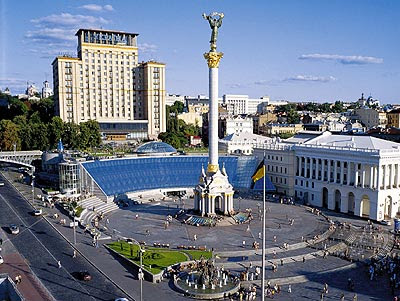Kiev or Kyiv (Ukrainian: Київ; Russian: Киев) is the capital and the largest city of Ukraine, located in the north central part of the country on the Dnieper River. The population as of the 2001 census was 2,611,300. However, higher numbers have been cited in the press.

Kiev is an important industrial, scientific, educational, and cultural centre of Eastern Europe. It is home to many high-tech industries, higher education institutions and world-famous historical landmarks. The city has an extensive infrastructure and highly developed system of public transport, including the Kiev Metro.
The name Kiev is said to derive from the name of Kyi, one of four legendary founders of the city (brothers Kyi, Shchek, Khoryv, and sister Lybid). During its history, Kiev, one of the oldest cities in Eastern Europe, passed through several stages of great prominence and relative obscurity. The city probably existed as a commercial centre as early as the 5th century. A Slavic settlement on the great trade route betweenScandinavia and Constantinople, Kiev was a tributary of the Khazars, until seized by the Varangians (Vikings) in the mid-9th century. Under Varangians rule, the city became a capital of the Rus', the first East Slavic state. Completely destroyed during the Mongol invasion in 1240, the city lost most of its influence for the centuries to come. It was a provincial capital of marginal importance in the outskirts of the territories controlled by its powerful neighbours; first the Grand Duchy of Lithuania, followed by Poland and Russia.


